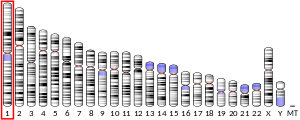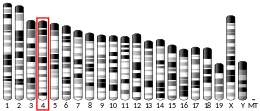MYCBP
| MYCBP | |||||||||||||||||||||||||
|---|---|---|---|---|---|---|---|---|---|---|---|---|---|---|---|---|---|---|---|---|---|---|---|---|---|
| |||||||||||||||||||||||||
| Identifiers | |||||||||||||||||||||||||
| Aliases | MYCBP, AMY-1, MYC binding protein | ||||||||||||||||||||||||
| External IDs | MGI: 1891750 HomoloGene: 49312 GeneCards: MYCBP | ||||||||||||||||||||||||
| |||||||||||||||||||||||||
| |||||||||||||||||||||||||
| |||||||||||||||||||||||||
| Orthologs | |||||||||||||||||||||||||
| Species | Human | Mouse | |||||||||||||||||||||||
| Entrez | |||||||||||||||||||||||||
| Ensembl | |||||||||||||||||||||||||
| UniProt | |||||||||||||||||||||||||
| RefSeq (mRNA) | |||||||||||||||||||||||||
| RefSeq (protein) | |||||||||||||||||||||||||
| Location (UCSC) | Chr 1: 38.86 – 38.87 Mb | Chr 4: 123.9 – 123.91 Mb | |||||||||||||||||||||||
| PubMed search | [3] | [4] | |||||||||||||||||||||||
| Wikidata | |||||||||||||||||||||||||
| |||||||||||||||||||||||||
C-Myc-binding protein is a protein that in humans is encoded by the MYCBP gene.[5][6]
Function
The MYCBP gene encodes a protein that binds to the N-terminal region of MYC (MIM 190080) and stimulates the activation of E box-dependent transcription by MYC.[supplied by OMIM][6]
Interactions
MYCBP has been shown to interact with AKAP1,[7][8] C3orf15[7] and Myc.[5]
References
- 1 2 3 GRCh38: Ensembl release 89: ENSG00000214114 - Ensembl, May 2017
- 1 2 3 GRCm38: Ensembl release 89: ENSMUSG00000028647 - Ensembl, May 2017
- ↑ "Human PubMed Reference:".
- ↑ "Mouse PubMed Reference:".
- 1 2 Taira T, Maëda J, Onishi T, Kitaura H, Yoshida S, Kato H, Ikeda M, Tamai K, Iguchi-Ariga SM, Ariga H (Aug 1998). "AMY-1, a novel C-MYC binding protein that stimulates transcription activity of C-MYC". Genes to Cells. 3 (8): 549–65. doi:10.1046/j.1365-2443.1998.00206.x. PMID 9797456.
- 1 2 "Entrez Gene: MYCBP c-myc binding protein".
- 1 2 Yukitake H, Furusawa M, Taira T, Iguchi-Ariga SM, Ariga H (Nov 2002). "AAT-1, a novel testis-specific AMY-1-binding protein, forms a quaternary complex with AMY-1, A-kinase anchor protein 84, and a regulatory subunit of cAMP-dependent protein kinase and is phosphorylated by its kinase". The Journal of Biological Chemistry. 277 (47): 45480–92. doi:10.1074/jbc.M206201200. PMID 12223483.
- ↑ Furusawa M, Ohnishi T, Taira T, Iguchi-Ariga SM, Ariga H (Sep 2001). "AMY-1, a c-Myc-binding protein, is localized in the mitochondria of sperm by association with S-AKAP84, an anchor protein of cAMP-dependent protein kinase". The Journal of Biological Chemistry. 276 (39): 36647–51. doi:10.1074/jbc.M103885200. PMID 11483602.
Further reading
- Furusawa M, Ohnishi T, Taira T, Iguchi-Ariga SM, Ariga H (Sep 2001). "AMY-1, a c-Myc-binding protein, is localized in the mitochondria of sperm by association with S-AKAP84, an anchor protein of cAMP-dependent protein kinase". The Journal of Biological Chemistry. 276 (39): 36647–51. doi:10.1074/jbc.M103885200. PMID 11483602.
- Yukitake H, Furusawa M, Taira T, Iguchi-Ariga SM, Ariga H (Aug 2002). "AMAP-1, a novel testis-specific AMY-1-binding protein, is differentially expressed during the course of spermatogenesis". Biochimica et Biophysica Acta. 1577 (1): 126–32. doi:10.1016/s0167-4781(02)00411-6. PMID 12151104.
- Yukitake H, Furusawa M, Taira T, Iguchi-Ariga SM, Ariga H (Nov 2002). "AAT-1, a novel testis-specific AMY-1-binding protein, forms a quaternary complex with AMY-1, A-kinase anchor protein 84, and a regulatory subunit of cAMP-dependent protein kinase and is phosphorylated by its kinase". The Journal of Biological Chemistry. 277 (47): 45480–92. doi:10.1074/jbc.M206201200. PMID 12223483.
- Furusawa M, Taira T, Iguchi-Ariga SM, Ariga H (Dec 2002). "AMY-1 interacts with S-AKAP84 and AKAP95 in the cytoplasm and the nucleus, respectively, and inhibits cAMP-dependent protein kinase activity by preventing binding of its catalytic subunit to A-kinase-anchoring protein (AKAP) complex". The Journal of Biological Chemistry. 277 (52): 50885–92. doi:10.1074/jbc.M206387200. PMID 12414807.
- Tomsig JL, Snyder SL, Creutz CE (Mar 2003). "Identification of targets for calcium signaling through the copine family of proteins. Characterization of a coiled-coil copine-binding motif". The Journal of Biological Chemistry. 278 (12): 10048–54. doi:10.1074/jbc.M212632200. PMID 12522145.
- Gevaert K, Goethals M, Martens L, Van Damme J, Staes A, Thomas GR, Vandekerckhove J (May 2003). "Exploring proteomes and analyzing protein processing by mass spectrometric identification of sorted N-terminal peptides". Nature Biotechnology. 21 (5): 566–9. doi:10.1038/nbt810. PMID 12665801.
- Rual JF, Venkatesan K, Hao T, Hirozane-Kishikawa T, Dricot A, Li N, Berriz GF, Gibbons FD, Dreze M, Ayivi-Guedehoussou N, Klitgord N, Simon C, Boxem M, Milstein S, Rosenberg J, Goldberg DS, Zhang LV, Wong SL, Franklin G, Li S, Albala JS, Lim J, Fraughton C, Llamosas E, Cevik S, Bex C, Lamesch P, Sikorski RS, Vandenhaute J, Zoghbi HY, Smolyar A, Bosak S, Sequerra R, Doucette-Stamm L, Cusick ME, Hill DE, Roth FP, Vidal M (Oct 2005). "Towards a proteome-scale map of the human protein-protein interaction network". Nature. 437 (7062): 1173–8. doi:10.1038/nature04209. PMID 16189514.
- Ishizaki R, Shin HW, Iguchi-Ariga SM, Ariga H, Nakayama K (Aug 2006). "AMY-1 (associate of Myc-1) localization to the trans-Golgi network through interacting with BIG2, a guanine-nucleotide exchange factor for ADP-ribosylation factors". Genes to Cells. 11 (8): 949–59. doi:10.1111/j.1365-2443.2006.00991.x. PMID 16866877.
- Sedoris KC, Thomas SD, Miller DM (Jul 2007). "c-myc promoter binding protein regulates the cellular response to an altered glucose concentration". Biochemistry. 46 (29): 8659–68. doi:10.1021/bi7003558. PMID 17595061.
This article is issued from
Wikipedia.
The text is licensed under Creative Commons - Attribution - Sharealike.
Additional terms may apply for the media files.



